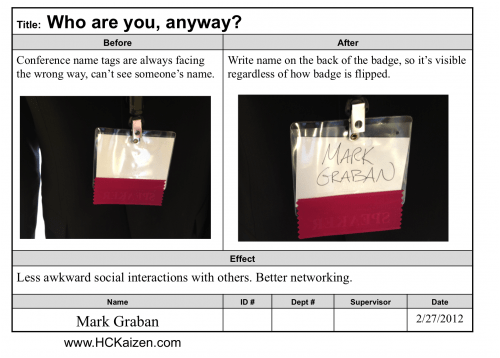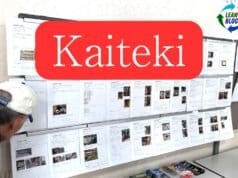I spent Monday and Tuesday in lovely Phoenix at the ASQ Lean and Six Sigma annual conference. I saw many friends there, including Karen Martin, former (and possibly future) guest blogger Mike Lopez, and Tony Manos from 5S Supply. The conference was kicked off by a great keynote by Ari Weinzwegi, a founder and CEO of the amazing Zingerman's in Ann Arbor and I'll blog about that real soon.
As tends to happen at conferences, I also ran into some folks I have met once or twice before. I can be really bad about connecting a name to a face when I'm surprised to bump into a familiar face. I try to cheat and glance at the conference name tag when I can… but more often than not, the dang thing is turned around backward, so you can't read the name! I came up with a “quick and easy kaizen” to try to address this in a simple, inexpensive way.
With the badge hanging around your neck, most lanyards have that annoying tendency to flip around and face the wrong way. The quickest countermeasure I could come up with was to write my name, in pen, on the BACK of the name badge. That way, if my name badge was backward, people could still see my name. But that didn't help with my problem of not being able to see the names of others.
Anyway, since I was speaking about kaizen, or continuous improvement (the theme of our upcoming book Healthcare Kaizen), I decided to write up a simple Quick and Easy Kaizen report, using the model my co-author's organization learned from Norman Bodek.
Here is my Kaizen (click for a larger view):
I think this qualifies as a classic Kaizen (small change for the better) since it:
- Addressed (maybe not perfectly) a problem I was personally facing
- I took the initiative to make the change (I don't have a “manager” to talk it over with, in my role)
- It was quick and easy – didn't cost any money really
- I could test the impact of the change, following the PDSA model
I was able to work this example into my conference talk to try to share the idea and get feedback.
Normally, the Kaizen process involves discussion with one's supervisor and a team. It's not a solo exercise. I was hoping that sharing the Kaizen report would prompt others to “steal” my idea (which is completely OK with Kaizen). During my session, I saw some people, right away, writing their name on the back of their badge.
I think a situation like this shows that people will readily choose to adopt a change that isn't their idea — if it makes sense and if it addresses a problem they have. We don't have to force the spread of improvement ideas. Good ideas will spread.
In the workshop, I got some great feedback, as we might get in the workplace:
- Could you use a sharpie to make it easier to read?
- Why didn't you address the root cause of why the name badge turned backward?
- Could conferences just print your name on both sides?
- Couldn't you just get a clip and attach it to your jacket in a way that won't flip backward?
Great ideas and great input. I didn't know the root cause for why badges flip backward, so I didn't have a good countermeasure for that. But, as they say “don't let perfect get in the way of better. Even if it wasn't the best ultimate countermeasure, I think my countermeasure was a good start.
It was fun to see, over the next two days, how some other people had written their name on the back of the name badge. Let's see what sort of long-term countermeasure or process change that ASQ (and other conferences) can up with for future events.
At the very end of the second day of the conference, two women who had been in my workshop stopped to thank me for the Kaizen presentation. One woman wanted me to see how the other had written her name on the back of her badge, but she had, herself, not written her name on back of her badge. “I meant to, but I forgot,” she said. We talked about how that goes to show that when you have an idea for improvement you need to:
- Take immediate action on the idea (before you forget)
- Have a system to keep track of that idea until it can be implemented (a visual idea board or a system like KaiNexus, a company I work with and own a small stake in)
Please scroll down (or click) to post a comment. Connect with me on LinkedIn.
Let’s work together to build a culture of continuous improvement and psychological safety. If you're a leader looking to create lasting change—not just projects—I help organizations:
- Engage people at all levels in sustainable improvement
- Shift from fear of mistakes to learning from them
- Apply Lean thinking in practical, people-centered ways
Interested in coaching or a keynote talk? Let’s start a conversation.











It’s even worse if you’re talking to a woman Mark, given the area of the body name badges are typically located. You don’t want to be caught staring there for too long trying to figure out the persons name!
Found some tips here on what you can do should this happen to you
http://www.doingitforme.com/forgotten-someones-name-use-these-tricks/
Not really Kaizen but might help you in the there and now.
Mark – great example of Quick & easy Kaizen and how one good idea leads to many more. That’s the power of engaging people and building upon each others ideas. Never ending continuous improvement.
Angela Hospice is now printing names on both sides of our name tags because they flip. It really helps family, patients, staff and others see the names.
That’s great, I’m sure that’s very helpful.
To the readers — I think this is the first time my mom has commented here on the blog (my dad has commented before). Thanks for the comment! :-)
Great stuff. I did a very similar thing to my badge and lanyard at Fusion11 where I was presenting on Quick and Easy Kaizen. I had improved my badge with several kaizens(moved pocket guide to the back, removed lunch tickets so they wouldn’t fly out when removing the pocket guide, displaying the current days schedule only, weighted it so it wouldn’t flip, etc) and I used it to show the attendees in my breakout. It was very helpful and gave people an instant example of applying continuous improvement to solve small problems.
Love this simple improvement Mark! Wish we would have thought of it at the ASQ Audit Conference last year. I’m also terrible with names and get caught every time I try to sneak a peak at someone’s name badge. Looking forward to more more great posts.
I used your suggestion and it became a talking point and instant conversation starter a couple times. Double Kaizen! Not only helped people know my name, but helped break the ice, too.
[…] March 7th, 2012 → 3:32 pm @ Mark Graban // No Comments Tweet This is a Kaizen I implemented at the ASQ Lean and Six Sigma conference. Read more here at LeanBlog.org. […]